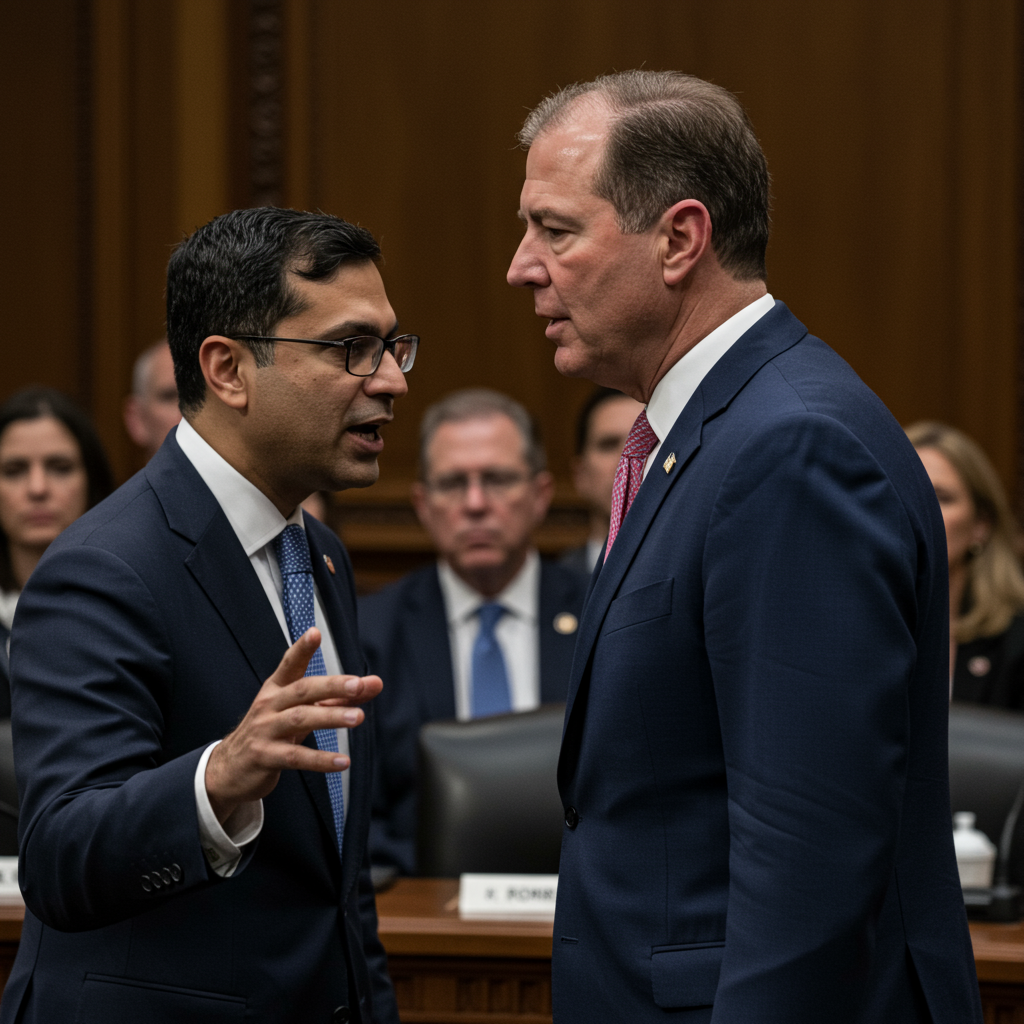A high-stakes Senate Judiciary Committee hearing on September 16, 2025, erupted into a series of unprecedented shouting matches, dramatically highlighting the intense partisan animosity engulfing Washington D.C. At the epicenter was FBI Director Kash Patel, whose testimony was frequently derailed by heated exchanges with Democratic Senators, most notably Adam Schiff of California and Cory Booker of New Jersey. The contentious session, marked by personal attacks and sharp accusations, underscored deep divisions over the FBI’s leadership, operational priorities, and the perceived politicization of the agency.
The Capitol Hill proceedings, intended for oversight of the Federal Bureau of Investigation, quickly devolved from policy debate to personal affronts, with Chairman Chuck Grassley repeatedly struggling to restore order amidst the vitriol. This detailed account delves into the core confrontations, the specific issues that fueled the outbursts, and the broader context of Director Patel’s challenging testimony.
Explosive Clash: Senator Schiff vs. FBI Director Patel
The most anticipated and arguably most volatile confrontation occurred between Senator Adam Schiff and FBI Director Kash Patel. Their years-long political feud, deeply rooted in past controversies, reached a dramatic crescendo during questioning regarding the Justice Department’s decision to move Ghislaine Maxwell—a key associate of convicted sex offender Jeffrey Epstein—to a lower-security prison facility.
Senator Schiff directly challenged Patel, questioning the assertion that the Bureau of Prisons made the decision independently. He pressed Patel on whether he truly believed the American public was “stupid” enough to accept this explanation, implying a politically motivated maneuver orchestrated by the White House. The Senator’s skepticism suggested a deliberate attempt to manipulate the legal process, drawing a swift and furious response from Director Patel.
Patel vehemently rejected Schiff’s insinuations, asserting his primary focus was “protecting this country, providing historic reforms and combatting the weaponization of intelligence by the likes of you.” He then launched a scathing personal attack, accusing Schiff of being a serial “liar in Russiangate, in January 6.” Patel did not mince words, labeling Schiff “the biggest fraud to ever sit in the United States Senate,” a “disgrace to this institution and an utter coward,” and ultimately “a political buffoon at best.”
Schiff, equally incensed, retorted that the situation “stinks to high heaven” and countered Patel’s insults by likening him to an “internet troll,” stating that even as FBI director, Patel “will always be nothing more than an internet troll.” The exchange escalated into a full-blown shouting match, necessitating Senator Dick Durbin, the top Democrat on the Judiciary panel, to plead with Chairman Grassley to assert control. Grassley, pounding his gavel repeatedly, issued direct commands for both men to be quiet, a stark indication of the breakdown of decorum.
The Deep Roots of Animosity
The animosity between Schiff and Patel is not new, tracing back to significant political investigations where their roles placed them squarely on opposing sides. During Schiff’s tenure as chair of the House Intelligence Committee, he led the investigation into Russian interference in the 2016 presidential election. At that time, Patel, then a House Intelligence staffer, was tasked with efforts to discredit Schiff’s probe.
Five years later, their paths diverged again during the investigation into the January 6, 2021, attack on the Capitol. Schiff served on the select committee investigating the events, while Patel publicly advocated for many of the incarcerated rioters. Leading up to Patel’s confirmation as FBI Director, Senate Judiciary Democrats highlighted past social media posts by Patel, including one meme depicting him with a chainsaw near Schiff’s head and another showing him with Schiff’s face beside a catapult. More recently, Patel has accused Schiff of leaking incriminating information about President Donald Trump, claims Schiff has consistently denied through a spokesperson.
Another Volatile Exchange: Senator Booker Challenges Patel’s Leadership
The clash with Senator Schiff was not the only explosive moment of the day. Director Patel also engaged in a similarly heated confrontation with Senator Cory Booker (D-N.J.), who launched a direct assault on Patel’s leadership and integrity. Senator Booker initiated his questioning by accusing Patel of dishonesty, specifically alleging that Patel had lied during his Senate confirmation hearing by promising not to fire FBI agents in retaliation for political investigations.
Booker contended that Patel had since “pushed out senior FBI agents with decades of knowledge and experience,” creating an unprecedented situation where neither the FBI Director nor the Deputy Director possessed prior FBI experience. Furthermore, Booker claimed that Patel had shifted the agency’s priorities to primarily pursuing former President Donald Trump’s immigration enforcement agenda, concluding that Patel’s leadership had rendered the country “weaker and less safe.”
Patel vehemently rejected Booker’s accusations, shouting back that “America is safer because of the FBI” under his direction and dismissing Booker’s statements as a “rant of false information that does not bring this country together.” As Booker attempted to interject, Patel raised his voice, demanding, “It’s my time — not yours,” escalating the exchange into a full-blown shouting match. Booker, in turn, predicted Patel’s tenure as FBI Director would be short-lived, suggesting Patel’s “supplication” to Donald Trump would ultimately lead to his dismissal, as Trump has historically shown disloyalty to his subordinates.
The exchange further devolved as Patel called Booker “an embarrassment to your country” and attempted to end his speaking time, prompting Booker to assert that only the people of New Jersey determine his time in office. Both men were described as raising their voices and pointing fingers, with Patel yelling, “I’m not going anywhere!” and Booker retorting, “I am not afraid of you!” Dissatisfied with Grassley’s handling of the session, Booker eventually walked out of the hearing in protest.
Broader Concerns: Investigating Charlie Kirk and Jeffrey Epstein
Beyond the personal clashes, Director Patel was grilled on several high-profile investigations and his management of the Bureau.
The Charlie Kirk Assassination Investigation
Patel faced scrutiny over his handling of the investigation into the assassination of conservative political commentator Charlie Kirk. He defended his actions regarding a social media post during the manhunt that prematurely announced a subject was in custody, who was later released. Patel acknowledged he “could have been more careful in my verbiage” but defended his actions as an effort to work with the public. He detailed the FBI’s extensive efforts, including interviews, cellphone analysis, the deployment of specialized teams, and the collection of thousands of tips and digital submissions. He noted that new video and enhanced photos led to the suspect’s father identifying and turning him in. Patel also confirmed the FBI was actively investigating a Discord chat where the suspect allegedly confessed, with “a lot more than 20” individuals involved in that chat under investigation.
The Jeffrey Epstein Case
The FBI Director also defended the Bureau’s handling of the Jeffrey Epstein case. He placed blame squarely on former Labor Secretary Alex Acosta for his actions as a prosecutor in 2006, describing Acosta’s initial handling, including limited search warrants and a non-prosecution agreement, as the “original sin.” Patel clarified that Epstein was emphatically not an FBI asset and stated there was no credible information indicating Epstein trafficked women to anyone other than himself, though he encouraged those with information to come forward. He also pointed out that previous Democratic administrations had access to Epstein files and defended an unsigned DOJ/FBI memo asserting no incriminating client list was found as a transparency effort.
FBI Personnel and Allegations of “Weaponization”
A significant portion of the hearing focused on accusations of politically motivated firings and the implementation of “loyalty tests” within the FBI. Senators pressed Patel on whether employees were terminated for their work on Trump or January 6th investigations. Patel repeatedly denied these claims, stating, “No one at the FBI is terminated for case assignments alone,” and unequivocally denied terminations were “in part” due to those assignments. He denied taking orders from the White House regarding personnel decisions and rejected the idea of having an “enemies list.” Patel asserted the FBI “won’t be weaponized anymore” and is conducting analyses of individuals who may have weaponized the agency. He also denied using polygraphs to assess loyalty or negative comments about him, clarifying their use was for tracking leaks.
Concerns were also raised about the appointment of Dan Bongino as Deputy Director, who was criticized by Senator Durbin as a “conspiracy theorist.” Patel declined to comment on ongoing investigations but defended Bongino’s public service.
Reactions and Implications
The tumultuous hearing concluded with strong reactions from all sides. Senator Schiff, in a social media post, contended that Patel went before lawmakers to “save his job” and argued he was “performing for an audience of one.” The White House, meanwhile, quickly congratulated Patel for “going after ‘Pencil Neck’”—the President’s nickname for Schiff. The events of the day underscored the profound partisan divides and personal animosity that continue to shape political discourse in Washington. Patel is scheduled to appear before the House Judiciary Committee on Wednesday, signaling further contentious testimony ahead.
Frequently Asked Questions
What prompted the intense confrontation between Senator Schiff and FBI Director Patel?
The primary catalyst for the shouting match between Senator Adam Schiff and FBI Director Kash Patel was Schiff’s questioning regarding the Justice Department’s decision to transfer Ghislaine Maxwell, an associate of Jeffrey Epstein, to a lower-security prison. Schiff challenged Patel on whether the Bureau of Prisons truly made the decision independently, implying a politically motivated action. Patel responded by accusing Schiff of weaponizing intelligence and being a “liar” in past investigations, leading to a heated exchange of personal insults.
What other high-profile investigations did FBI Director Patel address during his Senate testimony?
During the Senate Judiciary Committee hearing, FBI Director Kash Patel also addressed the ongoing investigation into the assassination of conservative political commentator Charlie Kirk, defending his early public statements and detailing the FBI’s extensive efforts in the case. He also discussed the Jeffrey Epstein case, placing blame on former Labor Secretary Alex Acosta for his original handling of the matter and denying Epstein was an FBI asset. Additionally, Patel clarified the FBI’s approach to combating AI chatbots used to harm children and noted efforts against cocaine trafficking from Venezuela.
What were the main criticisms leveled against FBI Director Kash Patel regarding his leadership of the Bureau?
FBI Director Kash Patel faced significant criticism regarding his leadership, particularly from Senator Cory Booker. Booker accused Patel of dishonesty during his confirmation hearing, alleging that Patel had since “pushed out senior FBI agents” and politicized the agency by shifting its priorities towards former President Trump’s immigration enforcement agenda. Critics also highlighted that neither Patel nor Deputy Director Dan Bongino had prior FBI experience. Concerns were raised about alleged “loyalty tests” and the “weaponization” of the FBI, although Patel vehemently denied these accusations.
The fiery exchanges and substantive debates during the Senate Judiciary Committee hearing provide a vivid snapshot of the current political landscape. Director Kash Patel’s testimony and the dramatic confrontations with Senators Schiff and Booker underscore the deep-seated divisions and the challenges inherent in leading a critical national institution amidst intense scrutiny. The events of September 16, 2025, will likely be remembered as a pivotal moment in the ongoing narrative of political tension and accountability in American governance.



